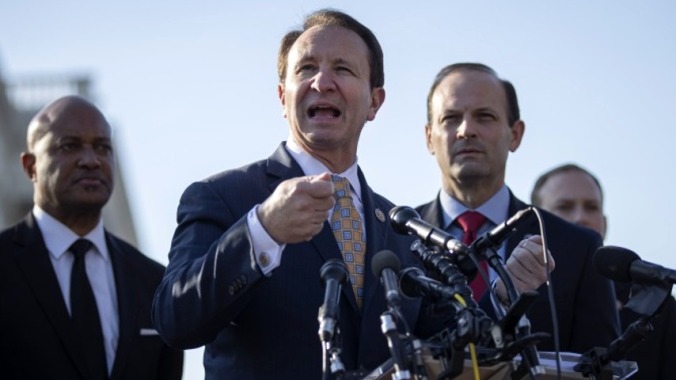Louisiana Governor Jeff Landry Thinks His Anti-Abortion Laws Are Great for Women
“Louisiana’s laws are pretty solid in respecting women and the decision between their doctor and themselves,” Landry told Rolling Stone. Are they now?
Photo: Getty Images AbortionPolitics Abortion
This week, a harrowing new report in the Louisiana Illuminator found Louisiana hospitals are already pulling misoprostol—a life-saving medication used for abortion and other pregnancy care—off birthing carts, weeks before a law to criminalize the medication is set to take effect.
The World Health Organization recognizes misoprostol as an essential medication to stop life-threatening postpartum hemorrhaging (a leading cause of maternal mortality), and also to treat chronic tinnitus in patients with diabetes or hypertension. So the stakes are actually life or death. But because misoprostol is also used to facilitate medication abortions, in May, Louisiana Gov. Jeff Landry (R) signed a law that classifies it as a “controlled dangerous substance.” The law—which compounds with the state’s total abortion ban—threatens those who possess it without a prescription with up to 20 years in prison. But, due to a lack of clarity from the state, doctors are preemptively getting rid of it out of an abundance of caution.
When confronted about Louisiana abortion laws, Landry’s response was utterly removed from reality. Speaking to journalist Lorena O’Neil for Rolling Stone, Landry expressed dismay with the “criticism” he faces—specifically, for enacting laws that medical experts and pregnant people say are endangering their lives. “Governors get criticized for being dictators, for being kings,” he said. But, he continued, “I’ve tried to allow these issues to percolate through the legislature. I will tell you Louisiana’s laws are pretty solid in respecting women and the decision between their doctor and themselves.” Landry wrote off the new barriers that pregnant people face to receive life-saving medical care as a mere “kerfuffle” and said it’s “absolutely not true” that Louisiana’s abortion laws bar people from being able to get essential care. In 2019, Louisiana’s Health Department ranked the state 47th out of 48 states on maternal mortality for Black women.
-

-

-

-

-

-

-

-

-

-

-

-

-

-

-

-

-

-

-

-

-

-

-

-

-

-

-

-

-

-

-

-

-

-

-

-

-

-

-

-








































